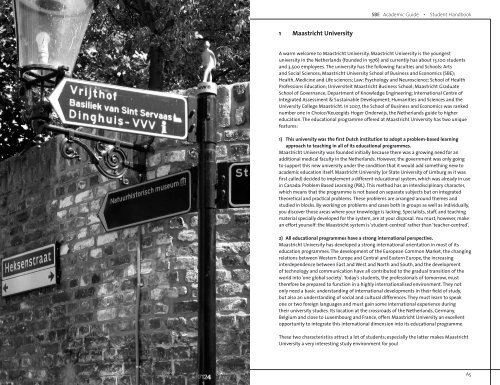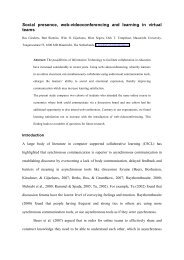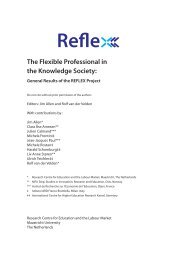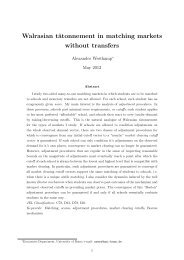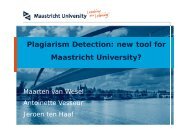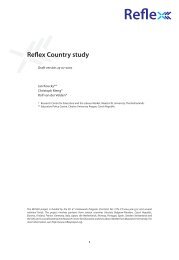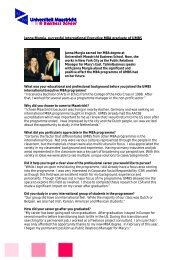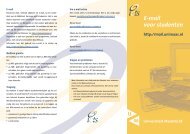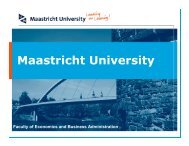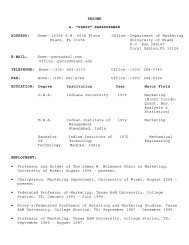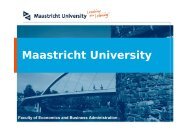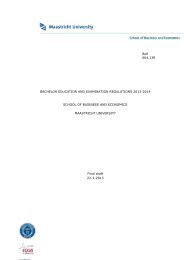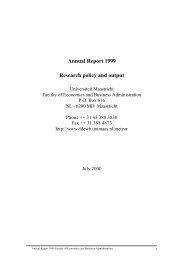Student Handbook - School of Business and Economics - Maastricht ...
Student Handbook - School of Business and Economics - Maastricht ...
Student Handbook - School of Business and Economics - Maastricht ...
Create successful ePaper yourself
Turn your PDF publications into a flip-book with our unique Google optimized e-Paper software.
<strong>Student</strong> <strong>H<strong>and</strong>book</strong> • Academic Guide SBE<br />
1 <strong>Maastricht</strong> University<br />
SBE Academic Guide • <strong>Student</strong> <strong>H<strong>and</strong>book</strong><br />
A warm welcome to <strong>Maastricht</strong> University. <strong>Maastricht</strong> University is the youngest<br />
university in the Netherl<strong>and</strong>s (founded in 1976) <strong>and</strong> currently has about 13,100 students<br />
<strong>and</strong> 3,500 employees. The university has the following Faculties <strong>and</strong> <strong>School</strong>s: Arts<br />
<strong>and</strong> Social Sciences; <strong>Maastricht</strong> University <strong>School</strong> <strong>of</strong> <strong>Business</strong> <strong>and</strong> <strong>Economics</strong> (SBE);<br />
Health, Medicine <strong>and</strong> Life sciences; Law; Psychology <strong>and</strong> Neuroscience; <strong>School</strong> <strong>of</strong> Health<br />
Pr<strong>of</strong>essions Education; Universiteit <strong>Maastricht</strong> <strong>Business</strong> <strong>School</strong>; <strong>Maastricht</strong> Graduate<br />
<strong>School</strong> <strong>of</strong> Governance; Department <strong>of</strong> Knowledge Engineering; International Centre <strong>of</strong><br />
Integrated Assessment & Sustainable Development; Humanities <strong>and</strong> Sciences <strong>and</strong> the<br />
University College <strong>Maastricht</strong>. In 2007, the <strong>School</strong> <strong>of</strong> <strong>Business</strong> <strong>and</strong> <strong>Economics</strong> was ranked<br />
number one in Choice/Keuzegids Hoger Onderwijs, the Netherl<strong>and</strong>s guide to higher<br />
education. The educational programme <strong>of</strong>fered at <strong>Maastricht</strong> University has two unique<br />
features:<br />
1) This university was the first Dutch institution to adopt a problem-based learning<br />
approach to teaching in all <strong>of</strong> its educational programmes.<br />
<strong>Maastricht</strong> University was founded initially because there was a growing need for an<br />
additional medical faculty in the Netherl<strong>and</strong>s. However, the government was only going<br />
to support this new university under the condition that it would add something new to<br />
academic education itself. <strong>Maastricht</strong> University (or State University <strong>of</strong> Limburg as it was<br />
first called) decided to implement a different educational system, which was already in use<br />
in Canada: Problem Based Learning (PBL). This method has an interdisciplinary character,<br />
which means that the programme is not based on separate subjects but on integrated<br />
theoretical <strong>and</strong> practical problems. These problems are arranged around themes <strong>and</strong><br />
studied in blocks. By working on problems <strong>and</strong> cases both in groups as well as individually,<br />
you discover those areas where your knowledge is lacking. Specialists, staff, <strong>and</strong> teaching<br />
material specially developed for the system, are at your disposal. You must, however, make<br />
an effort yourself: the <strong>Maastricht</strong> system is ‘student-centred’ rather than ‘teacher-centred’.<br />
2) All educational programmes have a strong international perspective.<br />
<strong>Maastricht</strong> University has developed a strong international orientation in most <strong>of</strong> its<br />
education programmes. The development <strong>of</strong> the European Common Market, the changing<br />
relations between Western Europe <strong>and</strong> Central <strong>and</strong> Eastern Europe, the increasing<br />
interdependence between East <strong>and</strong> West <strong>and</strong> North <strong>and</strong> South, <strong>and</strong> the development<br />
<strong>of</strong> technology <strong>and</strong> communication have all contributed to the gradual transition <strong>of</strong> the<br />
world into ‘one global society’. Today’s students, the pr<strong>of</strong>essionals <strong>of</strong> tomorrow, must<br />
therefore be prepared to function in a highly internationalised environment. They not<br />
only need a basic underst<strong>and</strong>ing <strong>of</strong> international developments in their field <strong>of</strong> study,<br />
but also an underst<strong>and</strong>ing <strong>of</strong> social <strong>and</strong> cultural differences. They must learn to speak<br />
one or two foreign languages <strong>and</strong> must gain some international experience during<br />
their university studies. Its location at the crossroads <strong>of</strong> the Netherl<strong>and</strong>s, Germany,<br />
Belgium <strong>and</strong> close to Luxembourg <strong>and</strong> France, <strong>of</strong>fers <strong>Maastricht</strong> University an excellent<br />
opportunity to integrate this international dimension into its educational programme.<br />
These two characteristics attract a lot <strong>of</strong> students; especially the latter makes <strong>Maastricht</strong><br />
University a very interesting study environment for you!<br />
A4 A5


